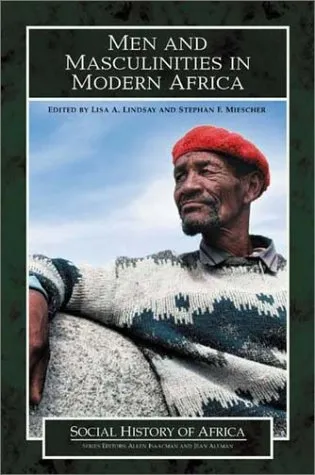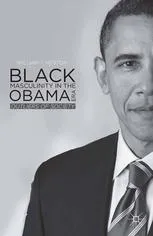Men and Masculinities in Modern Africa
4.5
بر اساس نظر کاربران

شما میتونید سوالاتتون در باره کتاب رو از هوش مصنوعیش بعد از ورود بپرسید
هر دانلود یا پرسش از هوش مصنوعی 2 امتیاز لازم دارد، برای بدست آوردن امتیاز رایگان، به صفحه ی راهنمای امتیازات سر بزنید و یک سری کار ارزشمند انجام بدینکتاب های مرتبط:
مقدمهای بر کتاب "Men and Masculinities in Modern Africa"
کتاب Men and Masculinities in Modern Africa که به قلم لیزا ای. لیندزی و استفان میشر ویراستاری شده است، تحلیلی جامع و چندوجهی از موضوع مردانگی (masculinity) و نقش مردان در قارهٔ آفریقا ارائه میدهد. این اثر به بررسی روندهای اجتماعی، فرهنگی، سیاسی و اقتصادی که در شکلگیری مفهوم مردانگی در جوامع مدرن آفریقایی تأثیر گذاشتهاند، میپردازد. ویراستاران تلاش کردهاند تا با گردآوری پژوهشهای مختلف و تحلیلهای دقیق، دیدگاهی چندبعدی نسبت به این موضوع ارائه دهند؛ دیدگاهی که بتواند شکافهای مطالعاتی موجود در این زمینه را پر کند.
خلاصهای دقیق و مفصل از کتاب
کتاب در قالب مجموعهای از مقالات ارائه میشود که هر یک از آنها به یکی از ابعاد مفهوم مردانگی در زمینههای مختلف آفریقا میپردازد. موضوعات مطرحشده در این کتاب شامل تحولات نقش مردان در دوران استعمار و پس از آن، تعامل میان جنسیت و پویاییهای اقتصادی، مباحث پیرامون مردانگی درون جنبشهای ملیگرایانه و بازنماییهای فرهنگی و هنری از مردانگی هستند. این کتاب از طریق تحلیلهایی عمیق، نشان میدهد که چگونه مفاهیم جنسیت و مردانگی با ساختارهای قدرت و سلسلهمراتب اجتماعی آمیخته شدهاند و در روند شکلدهی به هویتهای آفریقایی نقشی کلیدی ایفا میکنند.
یکی از موضوعات کلیدی مورد بحث در کتاب بررسی تأثیر استعمار و مدرنیزاسیون بر مردانگی است. ویراستاران و نویسندگان مقالات بهویژه بر این موضوع تأکید دارند که چگونه نیروهای فراسرزمینی—از جمله استعمارگری اروپا—الگوهای سنتی مردانگی را تغییر داده و به ظهور اشکالی جدید از روابط قدرت جنسیتی منجر شدهاند.
نکات کلیدی کتاب
- تلاش برای برجستهسازی پیچیدگیهای مردانگی در بسترهای مختلف تاریخی و جغرافیایی.
- بررسی تعاملات میان جنسیت، قدرت، مهاجرت و مدرنیته در آفریقا.
- تحلیل مفهوم "مردانگی هژمونیک" (hegemonic masculinity) و تأثیر آن بر جامعه و سیاست.
- تمرکز بر ارتباط مردانگی با طبقهٔ اجتماعی، نژاد و قومیت.
- مطالعهٔ نقش استعمار در بازنگری یا تحمیل مفاهیم جدید مردانگی.
نقلقولهای مشهور از کتاب
"مردانگی چیزی فراتر از ویژگیهای طبیعی یا زیستی است؛ بلکه محصول مذاکرات اجتماعی، تاریخی و فرهنگی است."
"مردانگی همواره در معرض بازتعریف قرار دارد، چرا که دائماً بهواسطهٔ نیروهای اجتماعی و اقتصادی مورد چالش قرار میگیرد."
"تحلیل مردانگی در آفریقا مستلزم درک این نکته است که جنسیت فقط بخشی از معادلهٔ پیچیدهٔ هویتی است."
چرا این کتاب اهمیت دارد؟
کتاب Men and Masculinities in Modern Africa یکی از معدود آثاری است که بهطور جامع به موضوع جنسیت در بافت آفریقا میپردازد. این کتاب فضای خالی موجود در ادبیات جنسیتی را پر کرده و راه را برای مطالعات آتی باز میکند. برای علاقهمندان به مطالعات آفریقا، جامعهشناسی، مطالعات جنسیت و تاریخ، این کتاب بهعنوان منبعی کلیدی و ضروری شناخته میشود. افزون بر این، دیدگاههای نوآورانه و بینرشتهای موجود در این اثر، درک دقیقتری از موضوع روابط جنسیتی و هویتی در جوامع مدرن آفریقا ارائه میدهد.
تأثیر این کتاب در عرصهٔ آکادمیک و فراتر از آن در درک بهتر پویاییهای اجتماعی و جنسیتی انکارناپذیر است. این اثر بهعنوان منبعی ارزشمند برای پژوهشگران و دانشجویانی که به تحلیل نقش جنسیت در تاریخ و سیاست معاصر علاقهمند هستند، جایگاه ویژهای دارد.
Introduction to Men and Masculinities in Modern Africa
In Men and Masculinities in Modern Africa, editors Lisa A. Lindsay and Stephan Miescher present an insightful and thought-provoking exploration of men’s roles and the constructions of masculinity in sub-Saharan Africa during the colonial and postcolonial periods. This scholarly work challenges the monolithic images often associated with African masculinities and sheds light on the diverse and evolving experiences of African men as they navigate cultural, political, and social change. By weaving together critical essays authored by leading scholars, this book provides a nuanced view of how African masculinities intersect with issues such as colonialism, nationalism, labor, and modernity.
The anthology positions men and their identities at the crossroads of history and sociology, offering readers a deeper understanding of how African masculinity has been shaped by and continues to shape larger societal dynamics. It critiques dominant Eurocentric discourses and introduces alternative narratives to expand the conversation around gender and power dynamics. From workers to fathers, soldiers to revolutionaries, the men discussed throughout this book reflect the multifaceted nature of masculinity in African societies. The examples span diverse regions and historical contexts, offering both local specificity and broader relevance, making Men and Masculinities in Modern Africa an invaluable resource for those seeking to understand the intersection of gender, history, and culture.
Detailed Summary of the Book
The book is divided into thematic essays that dissect the role of men in Africa through historical and cultural lenses. These essays cover a wide range of topics, including the influence of colonial rule on gender roles, the construction of male authority, the impact of migration and labor systems on male identity, and how African men engage with their roles as fathers, leaders, and husbands.
The contributors delve into questions of hegemony and power, examining how African men negotiated their status amid the disruptions of colonial rule and the advent of modernity. Essays such as those addressing the rise of “warrior masculinity,” the effect of wage labor on domestic roles, and the creation of paternalistic kinship systems highlight the complexity of African masculinities across time and space.
This work also engages with the global implications of African notions of masculinity, positioning them within larger discussions of gender studies. By treating African men not as a homogenous group but as individuals shaped by unique socio-political and cultural realities, Men and Masculinities in Modern Africa dismantles stereotypes and sheds light on the fluidity of gender roles.
Key Takeaways
- Masculinity is not a fixed or universal concept; it is shaped by cultural, historical, and social factors unique to specific regions in Africa.
- Colonial rule played a pivotal role in both transforming and reinforcing African gender roles, often privileging certain masculinities over others.
- Men’s roles as workers, fathers, and national leaders have evolved in response to economic shifts, political movements, and larger societal transformations.
- African masculinities intersect with larger global narratives, yet remain inherently rooted in local specificities and contexts.
- This book is an essential contribution to the study of gender in African history, challenging Eurocentric perspectives and opening new avenues for scholarly inquiry.
Famous Quotes from the Book
"Masculinity, like femininity, is always in the making; it is never static but continually shaped by historical forces and social expectations."
"To understand African men is to understand how they have navigated the profound disruptions and opportunities of colonialism, capitalism, and nationalism."
Why This Book Matters
In a world where discussions of gender often focus solely on women, Men and Masculinities in Modern Africa provides a vital counterpoint by centering African men in the conversation. This book is not just about masculinity; it is about how gender itself is a critical lens for understanding societal transformation in Africa. The editors’ interdisciplinary approach, combining historical analysis with gender studies, creates a comprehensive examination of African men’s experiences and challenges stereotypes that often dominate Western discourse.
Furthermore, this anthology demonstrates the significant role men played not only in colonial enterprises but also in resistance movements, the building of nations, and the negotiation of cultural identities in a rapidly globalizing world. Its scholarship makes it an essential resource for students and educators in gender studies, African history, and sociology. It encourages a broader rethinking of how we approach gender in non-Western contexts and provides new frameworks for considering the diversity and complexity of human experiences.
دانلود رایگان مستقیم
برای دانلود رایگان این کتاب و هزاران کتاب دیگه همین حالا عضو بشین
برای خواندن این کتاب باید نرم افزار PDF Reader را دانلود کنید Foxit Reader



